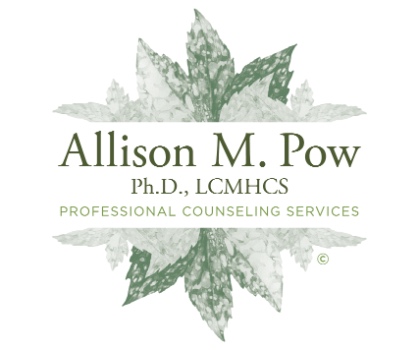
Welcome! I’m glad you’re here. Let me tell you about who I am and what I offer…
I am a Licensed Clinical Mental Health Counselor Supervisor (LCMHCS) in North Carolina (License #S13244) and a National Certified Counselor (Certification #226055). I have worked providing clinical counseling services in both outpatient and inpatient settings since 2007, with an emphasis on trauma work and crisis intervention.
I earned my Ph.D. in Counseling and Counselor Education from The University of North Carolina at Greensboro (UNCG) in 2014. I also hold M.S. and Ed.S. degrees in Community Counseling from UNCG (2007), and a B.S. in Psychology from Davidson College (2004). My graduate programs are all accredited by the Council for Accreditation of Counseling and Related Educational Programs (CACREP).
I have designed and taught graduate-level courses on psychological trauma, crisis intervention, grief, and mental health diagnosis, as well as assessment and research in counseling at multiple CACREP-accredited institutions. I have also done extensive research on the relationships between posttraumatic stress, attachment security, emotion regulation, and mindfulness.
I am trained in Eye Movement Desensitization and Reprocessing (EMDR), an evidence-based approach to addressing and reprocessing traumatic memories known to reduce the distress associated with those memories without requiring you to retell details of your story. My EMDR trainer is EMDRIA certified. If you'd like to read more about EMDR, you can find information and links to research here.
Now that you know about my qualifications, I’d like to share more about myself and my practice…
I opened my counseling practice in 2018 driven by a desire to return my focus to clinical work and to integrate my professional experience and knowledge with my love of working with survivors of all types of trauma.
My favorite thing about being a counselor is bearing witness to people’s stories and having the honor of helping them uncover parts of themselves that have been hidden away under the weight of mental and emotional pain. That pain may originate from past traumas, developmental obstacles, or disrupted relationships that can deeply affect how we come to know ourselves and our place in the world. Sometimes the pain is obvious and known, but so overwhelming that it’s hard to know how to begin sifting through it all. Sometimes it’s more insidious – it can sneak up on us at pivotal times in our lives when we are adjusting to new circumstances, career changes, or relationships, or when we inevitably run upon situations that echo past struggles unresolved.
My job is to help you explore the uncharted parts of who you are and to be your guide as we slowly, deeply accept and embrace even the broken and hurting parts of you. I believe that, by going through this journey together, we can uncover your unique story and help you chart the course for a life that feels purposeful, fulfilling, and self-affirming and - most importantly - gets you where you want to be.
My counseling approach has a developmental focus. I am influenced by several different theories, most prominently attachment and Adlerian approaches (which help to explain how people come to be the way they are through key attachment relationships and significant life experiences).
Extensive research and years of working with trauma survivors have taught me that these early relationships and experiences get embedded in our psyches and help to form the framework for who we become and how we navigate the world and relationships as adults. When we experience harmful, hurtful, or ruptured relationships as children, we learn that this way of relating to the world is normal and we come to expect it from others. Similarly, when we encounter a life experience so unexpected and totalizing that it wounds us to our core (e.g., abuse, neglect, life-threatening illness or injury, witnessing violence, disaster, loss of a close relationship), the world can suddenly become a frightening, unpredictable, and unsafe place. Traumatic experiences like these can challenge even our deepest sense of who we are and how we achieve safety in the world and force us to reorganize ourselves around a new and often painful reality. Sometimes parts of ourselves get lost in this reorganization – like pieces of a puzzle. And when the pieces no longer fit in the way they once did, we may feel lost, depressed, anxious, and even hopeless and wonder if life can ever feel joyful again.
I believe that it can. I believe that there is always hope for things to get better. But sometimes things have to come apart first. My job is to sit with you as we sort through the pieces of your puzzle slowly, compassionately, safely, at your pace. We will retrieve the lost or hidden pieces and we will figure out together how you want to put them all back together into your new life, so that you can move forward with confidence, self-compassion, a sense of direction, and a newfound appreciation for your story and the beautifully complex being that is your home.
